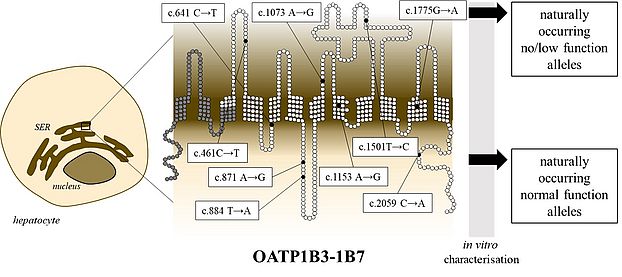/ Forschung
Genetic variants of SLCO1B7 are of relevance for the transport function of OATP1B3-1B7

The family of Organic Anion Transporting Polypeptides are known to facilitate the transmembrane transport. OATP1B3-1B7 is a novel member of the OATP1B-subfamily, and is encoded by SLCO1B3-SLCO1B7 readthrough deriving from the genes SLCO1B3 and SLCO1B7 on chromosome 12. The resulting protein is expressed in the smooth endoplasmatic reticulum of hepatocytes, is functional, and transports dehydroepiandrosterone-sulfate (DHEAS). In the gene area encoding for the 1B7-part of the protein, there are coding polymorphisms. It was the aim of this study to test the frequency and the impact of these genetic variants on transport activity.
The minor allele frequency (MAF) of the coding polymorphisms was determined in a cohort of 192 individuals. DHEAS transport function was determined by applying the vTF-7 based heterologous expression system using plasmids encoding for OATP1B3-1B7 or the respective variants. The genetic variants 641 T (MAF 0.021), 1073 G (MAF 0.169) and 1775 A (MAF 0.013) significantly reduced DHEAS accumulation in cells transfected with OATP1B3-1B7, albeit without significantly influencing expression of the transporter as determined by Western blot analysis and immunofluorescence after heterologous expression. Genotyping revealed complete linkage of the variants 884A, 1073 G and 1501C. Presence of the haplotype abolished the DHEAS-transport function of OATP1B3-1B7.
Naturally and frequently occurring genetic variants located within the gene region of SLCO1B7 encoding for the 1B7-part of OATP1B3-1B7 influence the in vitro function of this member of the OATP1B-family. With their functional characterisation, we provide the basis for pharmacogenetic studies, which may help to understand the in vivo relevance of this transporter. view full text
